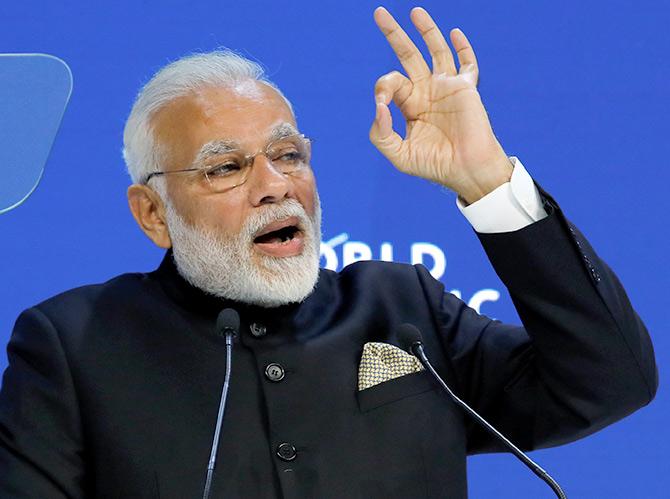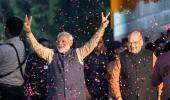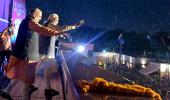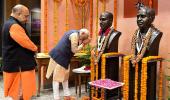The answer has two components: As a leader with a vision who can carry the masses and his ability to realise his vision through his decision-making and executive skills, says Colonel R Hariharan.

Prime Minister Narendra Damodardas Modi led from the front to win an unprecedented second term in the 2019 general election.
He has shown he is a hands-on leader, who does not hesitate to publicise his successes, rather than wasting time on explaining his failures.
The 2019 election results clearly show that for the Opposition parties Modi continues to remain 'a riddle, wrapped in a mystery, inside an enigma' to borrow a quote from Winston Churchill.
If the Opposition leaders want to survive the Modi headwind, they have to find answer to the question, what makes Modi tick?
This is perhaps the reason for their failure to evolve a proactive and coherent strategy to take on the Modi phenomenon.
The Opposition's reactive strategy focused on Modi's actions, which are his strength, than gut issues.
In terms of brand-building strategy, the Opposition went all wrong. By painting him as an ogre the Opposition ended up reinforcing Modi's image as an invincible leader.
Repeated slanging of Modi with meaningless slogans like 'Chowkidar chor hai', only showed the Opposition's paucity of strategic ideas to take on the BJP leader on his vulnerabilities.
Understanding Modi is difficult because some of his actions defy logic and conventional wisdom. But that is exactly what Modi did, when he sprang a surprise on the nation of 1.3 billion people in a televised speech. He told them their high value currencies would become useless unless they account for it through a bank.
What made him take this critical decision without going through the conventional process of decision making?
Only a leader with goal clarity, self-confidence, courage of conviction and trust in his team, takes a risky decision despite knowing it might damage his reputation as an effective leader. Such leaders are known for their out of the box solutions.
Was Modi's action driven by courage or foolhardiness? The jury may be still out on demonetisation, but for most of the voters it did not matter because they trusted him. The debate is likely to go on forever because out of the box decisions often defy conventional reasoning.
That is why politicians are generally reluctant to think out of the box. They prefer more pedestrian tried and trusted methods. Apparently, Modi's strength is he is not a conventional politician.
From a managerial perspective, Modi's leadership style can be analysed using a wide variety of tools used by management pundits. But political leadership does not lend itself to easy classification of styles expounded in management tomes.
Successful politicians are situational leaders, assuming different styles to suit the dynamics of an operational environment. How they manage it often defines their political longevity and public popularity.
In Modi's case, it was a combination of leadership charisma and exceptional decision-making and executive skills that enabled him to repackage and expand upon many of the well-conceived, but ill-managed, social welfare schemes of earlier governments.
What makes Modi tick? The answer has two components: As a leader with a vision who can carry the masses and his ability to realise his vision through his decision-making and executive skills. That makes him not only a PM, but a chief executive as well.
This is the reason Modi's style of closely monitoring of actions makes some of the bureaucrats uncomfortable as they are accustomed to the traditional 'file crawl'.
Modi's rise from the backwoods of Gujarat to the hallowed power centres of Lutyens New Delhi is not dissimilar to that of Benjamin Disraeli.
Disraeli, born in a Sephardic Jewish family of Italian mercantile background, rose to become prime minister of Great Britain twice in the 19th century. He was instrumental in taking many momentous decisions to take advantage of the decay of the Ottoman empire and the purchase of a major interest in the Suez Canal company.
Modi's rise seems to be based upon Disraeli's three pillars of learning: Seeing much, suffering much and studying much.
The prime minister's conduct as a national leader also reflects Disraeli's pithy observation: 'The secret of success is to be ready when your opportunity comes.'
Modi also exemplifies some of Disraeli's other leadership dictums. These include 'Courage is fire, and bullying is smoke' and 'Never complain and never explain.'
Modi is undoubtedly a charismatic leader, who can hold the audience spellbound with his simple but effective public speaking skills.
How much does charisma help Modi as a leader?
The well-known management guru Peter Drucker in a Harvard Business Review article in 2004 explained that effective executive does not need to be a charismatic leader. So the PM to be effective needs more than charisma.
Drucker, from his rich experience in 65 years of consulting, says some of the most effective chief executives varied in their personalities, attitudes, values, strengths, and weaknesses. They ranged from 'extroverted to nearly reclusive, from easy going to controlling, from generous to parsimonious'.
The management guru identified eight practices that made them effective. They asked two questions: What needs to be done. and what is right for the enterprise. These gave them the knowledge they needed.
They developed action plans and took responsibility for decisions and communicating the decisions to translate the knowledge into action. They ensured accountability and responsibility by focusing on opportunities rather than problems and emphasising 'we' rather than 'I'.
In the run-up to the 2014 election, it was Modi's charisma that attracted thousands of ordinary people who paid to hear his talks delivered with exceptional public speaking skills. They needed a narrative of action to add value to their lives.
But in the 2019 general election, even the adulatory public appear to have judged Modi on his performance rather than his oratorical skills. So the massive popular vote is probably a validation of Modi not only as a leader plus doer.
Colonel R Hariharan, a retired military intelligence analyst, served as the executive director of the Madras Management Association. He has been a corporate trainer for more than a decade.










